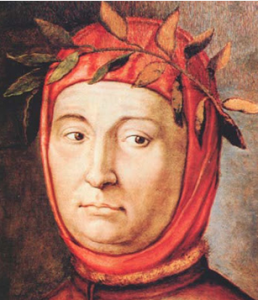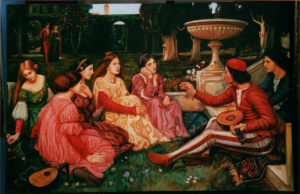Ode to a Florentine Or . . .
Requiem for a lost world
Our Italian friend Boccaccio wrote of the contemporary world he inhabited, a world in much the same condition as the one we currently occupy. You might recall Baccaccio lived through the plague of 1348; history refers to it as “The Black Death”, as it ravaged all of Europe, much of the known world, and more specifically, Boccaccio’s hometown, the ecclesiastical province of Florence. His experience inspired him to write The Decameron, a frame narrative evoking a tale of ten beautiful and aristocratic young people, seven women and three men, who fled Florence to escape the disease. As Europe lost more than a third of its population, this troupe of close friends and contemporaries remained sequestered in a villa outside the city, maintaining their health and sanity by relating stories to one another. Wrought from human suffering and utter anguish (If one third of the population perished, imagine how many friends and loved ones Boccaccio lost to the struggle) this story emerged to become one of the great works of literature.
I can’t help but see the obvious metaphor here, a world under attack from an enemy so small as to escape detection. The Oriental Rat Flea carried the plague, which in its first stage of life is a microscopic egg, as the life cycle progresses it then hatches into a larva, and lastly, after a metamorphosis, enters the adult stage, it’s most deadly. How was the physical death caused by this great plague any different than the Spiritual death we are dying?
If we grasp anything about the period of Italy’s Renaissance, we understand it represented a departure from a church controlled society, reconciliation of the West with Antiquity, the assimilation of knowledge, especially mathematics from the Arabic, the return of experimentalism, Secular Humanism, and shone a new light on the significance of living well in the present, or quality of life. A time emerged where more enlightened members of society embraced their classical roots based in the Roman and Greek traditions of Democracy, Arts and Letters, as well as Beauty to forge more holistic pathways to a deeper understanding of their own spiritual identity, the soul. As the political tide turned, the power base of the day relinquished its tyrannical hold on higher culture; specifically Lorenzo the Magnificent of the Florentine Medici who supported this new movement.

Giovanni Boccaccio
Unfortunately, and as often is the case in the human experience, the salient truths that were to emerge from this great struggle remain obscure, as we were unable to separate the tedium and oppression of religion from the necessity of an acknowledgement of The Divine, thus helping us to arrive at our current state. As a global society we have rejected Faith and The Divine, and embraced a secular explanation for all things. As fathers of the Renaissance (Rebirth), Dante, Petrarch, and our friend Boccaccio, never envisioned the abandonment of spiritual practice, nay, nor later the Christian Humanist and martyr Thomas Moore, they only pioneered the access to science and technology as a way of understanding our existence, and Creation
Alas, the disillusioned scholars that have followed have indeed touted science and technology as having the solutions to all ailments, and yet we continue to kill, maim and attack one another. With all the devices to become better organized, we have less and less time, for our families, our society and ourselves. Is not the enemy we fight swifter, deadlier and killing us faster in so many different ways than our old nemesis from centuries removed? Are not the rampant plague’s of materialism and narcissism, causing humans to disregard other humans, and fragmenting us all, one from the other in a kind of pandemic disassociation, and forcing us to live out our lives in distortion, which leads us to magical or delusional thinking, which in turn is a very similar infection to the former? And how will history deal with this period we are so dispassionately living in? So, is it a big surprise to anyone that these same people who were living in Boccaccio’s time, most of who were unaware of the deadly infection until it was too late, are the very same ones, at least in principle, that live today?

